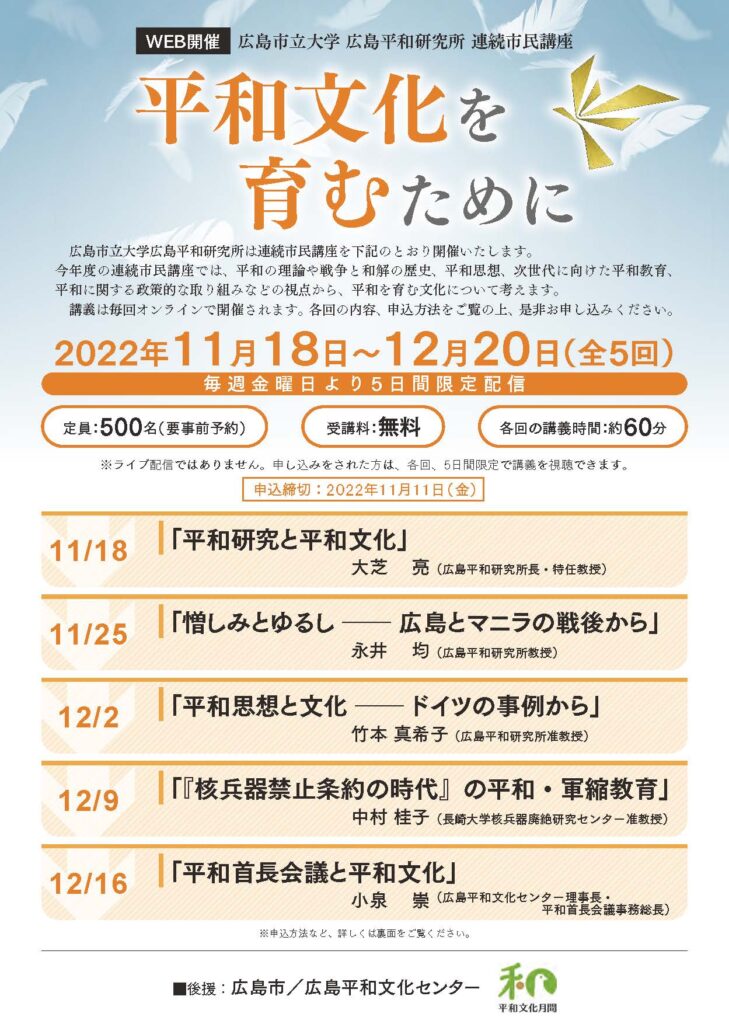広島市立大学広島平和研究所は連続市民講座を下記のとおり開催いたしました。今年度の連続市民講座では、平和の理論や戦争と和解の歴史、平和思想、次世代に向けた平和教育、平和に関する政策的な取り組みなどの視点から、平和を育む文化について全5回の講義を配信しました。
後援:広島市、広島平和文化センター
講座名 平和文化を育むために

■開催形式:YouTube配信。各回、約60分
■定員:500名
■受講料:無料
■申込締切:2022年11月22日(火)17:00【申込受付終了】
※通訳や翻訳の提供はありません。
※ご希望の回のみの視聴も可能です。
※ライブ配信ではありませんので、質疑応答の時間はありません。
※本講座に関して、許可なく、録音・録画・撮影・保存・公開・拡散することを禁じておりますので、ご承知おきください。
各回の視聴期間/内容/講師のプロフィール
第1回 11/18(金)~11/22(火)
「平和研究と平和文化」 大芝 亮 / 広島平和研究所長・特任教授
ロシアによるウクライナ侵攻を目の当たりにして、あらためて平和とは何か、平和を築くためにいかなる努力がなされてきたのか、平和文化を育むことは平和にどのように寄与できるのか、という問題を考えさせられています。本講義では、これらについて、平和研究におけるヨハン・ガルトゥングの理論等を参考に考察します。
▷講師のプロフィール
第2回 11/25(金)~11/29(火)
「憎しみとゆるし――広島とマニラの戦後から」 永井 均 / 広島平和研究所教授
第二次世界大戦では世界各地が焦土と化し、膨大な人命が失われ、多くの憎しみが生まれました。憎しみは敵意を増幅させ、平和への道を阻害します。本講義では、1945年2月に始まったマニラ市街戦と、それから半年後の広島への原爆投下を取り上げ、そこから生じた憎しみと、それを乗り越えようとした人々の思いを紹介します。
▷講師プロフィール
第3回 12/2(金)~12/6(火)
「平和思想と文化――ドイツの事例から」 竹本 真希子 / 広島平和研究所准教授
二度の世界大戦を経たドイツでは、新聞や雑誌、書籍などを通して、戦争と平和に関する議論が活発に行われてきました。本講義ではこうした20世紀ドイツの文化から平和思想の歴史を具体的に追い、ドイツにおける平和と文化の関係と平和思想の特徴、そして日本との違いについて考えていきます。
▷講師プロフィール
第4回 12/9(金)~12/13(火)
「『核兵器禁止条約の時代』の平和・軍縮教育」 中村 桂子 / 長崎大学核兵器廃絶研究センター准教授
2021年1月に発効した核兵器禁止条約は、軍縮条約として初めて、教育の重要性を明記しました。条約が目指す世界の実現に向けて、平和・軍縮教育はどのような役割を果たせるでしょうか。また、そのために広島・長崎の被爆地が貢献できることは何でしょうか。平和・軍縮教育の現在を概観し、これからの課題を考えます。
▷講師プロフィール
第5回 12/16(金)~12/20(火)
「平和首長会議と平和文化」 小泉 崇 / 広島平和文化センター理事長・平和首長会議事務総長
平和首長会議は、昨年7月に「持続可能な世界に向けた平和的な変革のためのビジョン」を新たに策定しました。それまでの「核兵器のない世界の実現」及び「安全で活力のある都市の実現」の二本柱に、「平和文化の醸成」を新たな目標に加えたのです。それでは「平和文化」とは何か、何を目指すものか共に考えましょう。
▷講師プロフィール
お問い合わせ
広島市立大学広島平和研究所事務室
E-mail:office-peace&m.hiroshima-cu.ac.jp
※E-mailを送付されるときは、&を@に置き換えて利用してください。
HPI Public Lecture Series on the Web AY2022
Enhancing Cultures of Peace
The Hiroshima Peace Institute (HPI) at Hiroshima City University presented a series of talks to explore the cultures that build peace from the perspectives of peace theory, the history of war and reconciliation, thoughts on peace, peace education for the next generation, and various policy initiatives related to peace in the HPI Online Public Lecture Series.
November 18-December 20, 2022 (Five lectures starting from Friday)
■Capacity: 500 people ■Fee: Free ■Lecture: 60 minutes
All lectures were recorded and made available on YouTube for a week for those who had signed up.
<Availability / Contents>
▶ 1st lecture: Nov. 18 (Fri) - Nov. 22 (Tue)
“Peace Research and the Culture of Peace”
Ryo Oshiba (Director and Specially Appointed Professor, Hiroshima Peace Institute)
Russia has invaded Ukraine. What factors contribute to peace? What kind of efforts have been made for peace? How does the culture of peace promote peace? This lecture will discuss these problems referring to Johan Galtung’s peace research theory.
▶ 2nd lecture: Nov. 25 (Fri) - Nov. 29 (Tue)
“Hatred and Forgiveness: After Warfare in Hiroshima and Manila”
Hitoshi Nagai, Professor at HPI
World War II scorched many parts of the world, resulting in enormous losses of life and profound hatreds. Hatred impedes the realization of peace and increases hostility. This lecture will focus on the Battle of Manila, which began in February 1945, and the atomic bombing of Hiroshima six months later, highlighting the hatreds that arose and the subsequent efforts of those survivors who sought to overcome them.
▶3rd lecture: Dec. 2 (Fri) - Dec. 6 (Tue)
“Peace and Culture in Germany”
Makiko Takemoto, Associate Professor at HPI
When it comes to peace education, Hiroshima is always mentioned as if the city is given a special meaning. In this lecture, the relationship between Hiroshima and Peace, an obvious matter of importance for the majority of people, will be reviewed to explore the new meaning of peace in the contemporary world.
▶4th lecture: Dec. 9 (Fri) - Dec. 13 (Tue)
“Peace and Disarmament Education in the ‘Era of the Treaty on the Prohibition of Nuclear Weapons’”
Keiko Nakamura, Associate Professor at Research Center for Nuclear Weapons Abolition, Nagasaki University (RECNA)
The Treaty on the Prohibition of Nuclear Weapons, which entered into force in January 2021, is the first disarmament treaty to stipulate the importance of education. What role can peace and disarmament education play in realizing the world envisioned by the treaty? And what can the A-bombed cities of Hiroshima and Nagasaki contribute to that end? This lecture will provide an overview of the current state of peace and disarmament education and consider the challenges it faces.
▶5th lecture: Dec. 16 (Fri) - Dec. 20 (Tue)
“Mayors for Peace and A Culture of Peace”
Takashi Koizumi, Chairperson at Hiroshima Peace Culture Foundation
July last year, Mayors for Peace adopted the Vision for Peaceful Transformation to a Sustainable World. The new vision includes, “Promote a culture of peace” as a new goal, in addition to the previous two pillars of, “Realize a world without nuclear weapons,” and “Realize safe and resilient cities.” Let’s think together about what “a culture of peace” is and what it aims to achieve.
■Information on the lecturers
▶Faculty members of the Hiroshima Peace Institute
▶Hiroshima Peace Culture Foundation
Contact:
Secretariat, Hiroshima Peace Institute, Hiroshima City University
E-mail: office-peace&m.hiroshima-cu.ac.jp
(*Please replace & with @)
